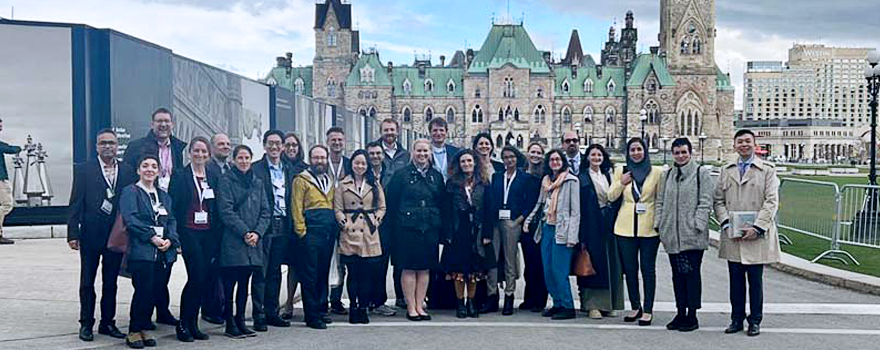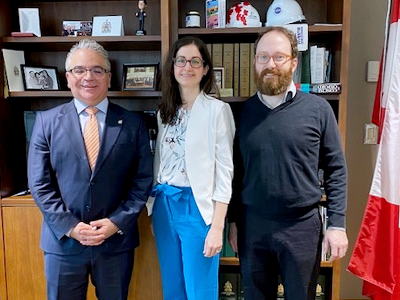Program brings together scientists and policymakers to improve communication, build relationships
 Jonathan Michaels, PhD (front row in yellow jacket), was one of 43 delegates from across the country who took part in the Science Meets Parliament program. (Canadian Science Policy Centre)
Jonathan Michaels, PhD (front row in yellow jacket), was one of 43 delegates from across the country who took part in the Science Meets Parliament program. (Canadian Science Policy Centre)
By Cam Buchan
COVID-19 raised serious questions about the use of scientific evidence in public policy and communications. Were policymakers being given advice that followed the evidence or simply supported a particular agenda?
Bringing together policymakers and scientists in an environment where the two groups can interact is the purpose of Science Meets Parliament, a program supported by the Canadian Science Policy Centre that allows the two groups to build relationships and break down stereotypes.
Jonathan Michaels, PhD, a postdoctoral fellow in the Department of Physiology and Pharmacology, was one of 43 delegates who took part in the program last summer. We caught up with Michaels to get his take on the importance of the program.
His key takeaway: “By connecting scientists directly to policymakers, this program is improving the flow of new knowledge from research into policymaking, which will ultimately benefit the Canadian public.”
Tell us about your research interests.
My work seeks to improve our fundamental understanding of how the brain controls reaching and grasping movements, which will ultimately lead to improved restoration of arm and hand function lost to trauma and disease. I begin a new chapter in July 2024 as an assistant professor at York University.
 Francesco Sorbara, MP for Vaughan-Woodbridge (left), meets with Mireille Schnitzer, PhD, and Jonathan Michaels, PhD, as part of the Science Meets Parliament program. (supplied photo)
Francesco Sorbara, MP for Vaughan-Woodbridge (left), meets with Mireille Schnitzer, PhD, and Jonathan Michaels, PhD, as part of the Science Meets Parliament program. (supplied photo)
What motivated you to get involved in the Science Meets Parliament program? And what are the ways you've been involved?
Recent years have seen the emergence of powerful new technologies such as large language models and brain-machine interfaces that are swiftly making their way into the public domain. Yet, the public policy needed to regulate these technologies is lagging behind. Science Meets Parliament was an opportunity to enhance my knowledge about the integration of science and technology into Canadian policy, both to understand my role in this system going forward and to find new ways for scientists to support Canadians through policy and science communication.
I was privileged to be one of the six Banting Fellows (plus 29 Canada Research Chairs and three Independent Indigenous researchers) selected to be part of the program, which included many training sessions on policy making, communication, etc., culminating in two days in Ottawa with additional training and meetings with members of Parliament, senators, and the chief science advisor of Canada.
In what ways did this program help you to better understand the role of scientific evidence in policymaking?
The program exposed me to numerous ways in which scientific evidence influences policy. Those included research summaries provided by the Library of Parliament for Parliamentarians, outreach from the chief science advisor, testimonies from scientists at House of Commons committee meetings, or the direct interactions I had with MPs and senators during my visit. Parliamentarians rely on the scientific community as a resource for them as they’re debating policy decisions.
How has this program influenced your outlook?
While the impact on my work is not immediate, my outlook has significantly shifted. The varied network of researchers I met, each specializing in fields distinct from my own, has provided a wealth of knowledge and experience that I can draw from in the future. Furthermore, this experience reinforced the significance of clear scientific communication at all levels, be it a discussion with a fellow scientist or a member of Parliament. Scientists all have a responsibility to advocate for the importance of their work.
How did the program help bridge the gap between the science and policy communities, and what recommendations do you have for further improving this connection?
“I urge all scientists to seriously reflect on the significance of their roles as science advocates.
—Jonathan Michaels
The program is bridging this gap in three ways: Acquainting scientists with the process of policymaking in Canada, familiarizing Parliamentarians with a diverse group of researchers across the nation, and facilitating connections between these two groups for fostering long-term relationships. I urge all scientists to seriously reflect on the significance of their roles as science advocates. This entails not only clear and honest communication of their research but also defending the integrity of science when required by bringing forward evidence.
In your opinion, what is the most pressing issue facing the intersection of science and policy in Canada?
In recent years, particularly during the rapidly evolving understanding of the SARS‑CoV‑2 virus, numerous concerns were raised regarding the integration of scientific evidence into policy and public communication. There were doubts about whether policymakers were being given advice that followed the evidence or rather followed a particular agenda.
Science Meets Parliament is addressing this issue by creating an environment for scientists and policymakers to interact without any specific agendas. The aim is to develop relationships through which researchers and policymakers can mutually benefit from each other. Opinions about ‘scientists’ as a group vary significantly, so opportunities that allow policymakers to see that scientists are individuals, with diverse experiences and motivations, are helping to break down stereotypes.
Would you recommend Science Meets Parliament to other researchers or professionals in the field, and why?
Without a doubt. Participating in this program has been an enriching experience for me. It provided an opportunity to learn, network, and contemplate the role of science in government. Given their deep understanding of their work, scientists are ideally placed to be advocates for their research and contribute to the public narratives about science. I wholeheartedly recommend the program.








